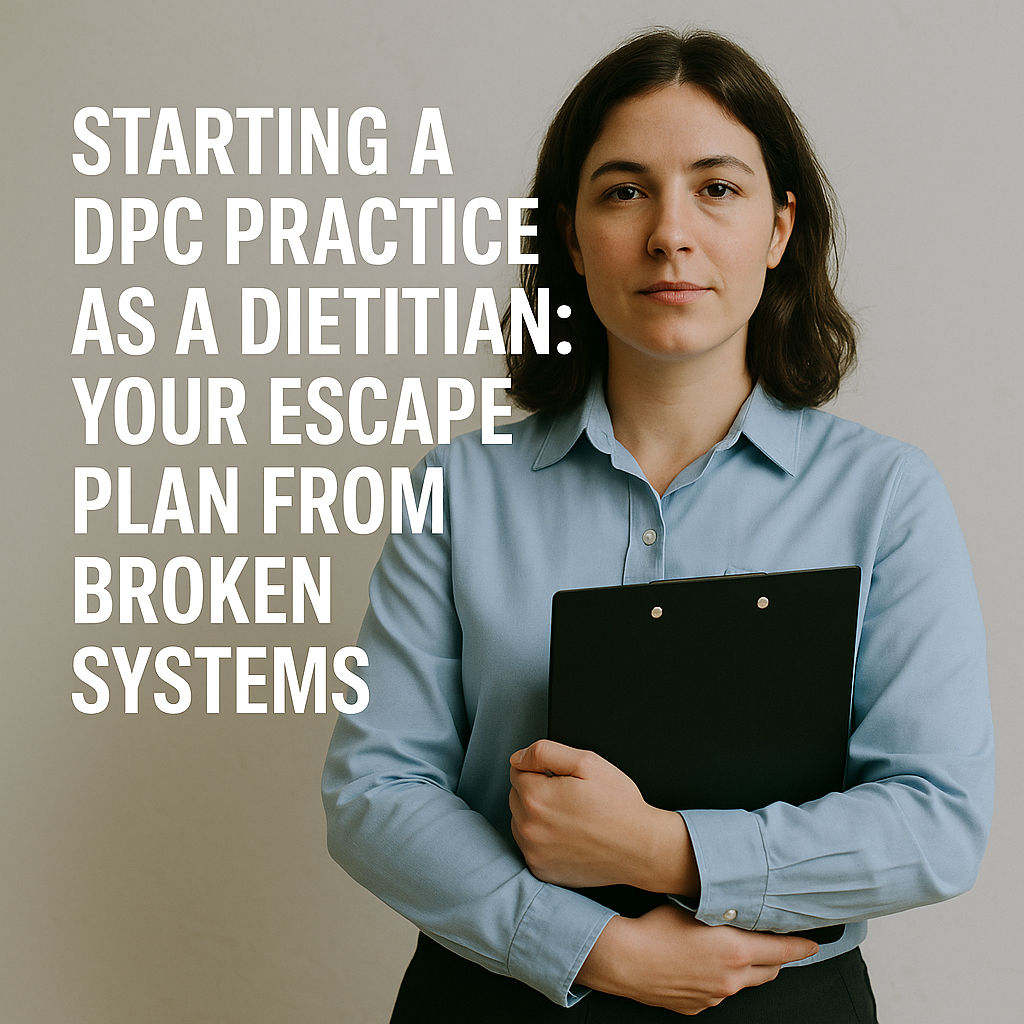Starting a direct primary care (DPC) practice as a dietitian is a declaration of independence. It’s the ideal solution for dietitians who are tired of being treated as disposable contractors rather than valued clinicians, while knowing your expertise is exactly what their patients need.
Stop waiting for the system to fix itself and start building a system that works for you and your patients. Let’s map out your escape route.
The Burnout Bridge: Why Traditional Models Are Failing Dietitians
Many dietitians flock to large telehealth platforms only to find poor working conditions, low pay, and a lack of basic professional respect. The traditional fee-for-service model, whether through insurance or corporate giants, often reduces your nutritional expertise to a quick, billable code.
Dietitians often don’t feel valued by doctors, and the solution to that problem requires thinking outside of the box. You can find the professional and financial fulfilment you seek by stepping out and building your own collaborative care team.
The traditional care model often leaves patients stuck as the go-between for their primary care physician (PCP), dietitian, and the rest of their care team. You can help eliminate this pain point by building a direct primary care dietitian practice with a powerful twist.
The Collaborative DPC Dietitian Business Model
The classic DPC model for dietitians is a membership-based model where patients pay a monthly fee directly to you for access to services. It’s a cash-only dietitian practice that frees you from insurance billing nightmares, but you can take things even further.
Instead of going at it alone, you can partner with like-minded PCPs, physician assistants (PAs), nurse practitioners (NPs), or Doctors of Osteopathic Medicine (DOs) who also want to break free from the corporate grind.
Partnering with other healthcare professionals creates an integrated practice where you’re no longer an external referral, but instead, a core part of a patient’s primary care team. This model directly addresses major care gaps in areas such as thyroid management, spinal leak care, metabolic health, and gastrointestinal disorders, where PCPs often lack the time or expertise to provide substantial nutritional counseling.
You, as a dietitian, can become an invaluable partner and/or founder from day one by sharpening your expertise to address these specific gaps. Many dietitians partner only with other dietitians, which continues to leave dietitians in a silo rather than streamlining care for the patient. For example, a dietitian could create a clinic and hire a nurse practitioner (NP) to cover aspects outside the dietitian’s scope of practice but within the NP’s scope.
Building Your Dream Practice: A Step-by-Step Guide
Starting a direct primary care dietetic practice requires a clear plan to transition from dream to reality. Some steps to consider include:
- Find Your Clinical Soulmate
Find a healthcare gap your expertise as a dietitian positions you to help address and start networking. Attend local medical meetups, engage with PCPs and other clinicians, and put yourself out there. Your pitch should be focused on how you can both build something better together, with you handling the complex nutritional caseload for shared patients. You’re not asking for a job; you’re offering a partnership.
[Related: How to Find Your Nutrition Niche as a Dietitian]
- Craft Your Membership Packages
Creating membership packages for the dietitian services you offer is where you can let your creativity shine. Ditch the one-size-fits-all approach and think of ways to provide value to clients while increasing your practice’s revenue.
Here’s an example of what your pricing structure might look like:
- Basic tier: This might include services like a monthly consultation, unlimited messaging, and educational resources.
- Premium tier: You can include additional services such as personalized meal plans, bi-weekly calls, and direct collaboration with their PCP.
If you’re wondering how to price DPC services as a dietitian, it’s simple. Start by researching your local market, calculating your desired direct primary care dietitian salary, and factoring in your skills and experience. A value-based pricing system beats hourly rates every time.
- Set Your Legal and Tech Foundation (The Less Fun, But Critical Part)
Choosing the proper legal structure for a DPC dietitian practice is essential. A Limited Liability Company (LLC) is a popular choice because of the liability protection it offers. Consult with an attorney when making this decision.
As far as software for direct primary care dietitians is concerned, you’ll need a platform that handles billing, scheduling, and communication. Look for an Electronic Medical Record system explicitly designed for a membership-based nutrition practice and fully HIPAA-compliant to make your life easier.
Is DPC Profitable for Dietitians? Let's Talk Numbers
Let's be blunt: Is DPC profitable for dietitians? Absolutely. When you compare direct primary care vs private practice for dietitians that rely on insurance, the financial clarity is a breath of fresh air.
In a traditional fee-for-service, insurance-based model vs. membership model showdown for access to dietitians, the membership model wins on stability. Instead of navigating through an unpredictable roller coaster of billable hours, the membership model delivers predictable, recurring revenue.
This makes building a patient panel in DPC dietetic and financial planning more manageable. You only need a specific number of members to surpass a dietitian's typical salary, and every additional member means extra earnings.
Your Action Plan for a Liberated Career
The path to starting and sustaining a profitable DPC for dietitians requires you to ditch the "dietitian island" mentality and embrace a collaborative, entrepreneurial spirit.
You recognize the current system is broken for you and your patients. A DPC dietitian business model solves the core problems many patients face, while providing you with the professional freedom and financial freedom you’ve always craved. Now’s the time for action, and you don’t have to build your private practice alone.
Ready to turn your vision into reality? Our team at Medical Office Marketing can help launch and market your direct primary care dietitian practice. We provide help with everything from creating your DPC dietitian business plan template to finding patients seeking DPC nutrition services.
Subscribe to our newsletter for more tips on starting a DPC practice as a dietitian and to glean insight on care gap trends or schedule a consultation today and take the first step toward turning your dream into reality.




